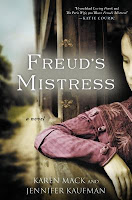Imprint Friday Monday: While Beauty Slept by Elizabeth Blackwell
 Welcome to Imprint
Welcome to Imprint FridayMonday and today's featured imprint: Amy Einhorn Books.
Stop by most weeks to be introduced to a must-read title from one
of my favorite imprints. I know you'll be adding many of these
books to your wish list.
I know it isn't Friday but I wanted to write about Elizabeth Blackwell's wonderful While Beauty Slept sooner than later. Although this novel has been described as a fairy tale retelling, I'd say it was inspired by Sleeping Beauty rather than being a variation on the familiar story.
Here are my thoughts in a Bullet Review.
- What's it about? The first thing to know about While Beauty Slept is that it doesn't include magic in the ordinary sense. The novel is set in medieval times and involves a king and his brother, two aunts, his wife, and his daughter. In a time of superstition, unexplained illnesses, and political unrest, King Ranolf goes against tradition and declares his only child, Rose, the heir to the throne. This unleashes the fury of his great-aunt Millicent, who curses the girl, predicting that Rose and her kingdom will be destroyed just as she reaches the peak of her beauty.
- Structure. The story is told in retrospect by Elise, who was first the queen's personal maid and later a companion to Rose. When the elderly Elise overhears her granddaughter telling the story of a beautiful princess who was cursed to sleep in a tower until awakened by true love's kiss, she decides it's time to reveal what really happened within the castle walls.
- Medieval life. As Elise moves between the servants' halls and the queen's rooms, she is privy to much of what happens in the castle and is witness to how Millicent's threats were able to undermine the stability of the court. Through Elise's eyes, we learn about everyday life in the castle, the conflict between romantic love and personal ambition, and the great contrast between expectations above and below stairs.
- Playing on fear. In Blackwell's view, the true power of the curse was the fear it instilled in the king and queen. The threat to their daughter colored every decision they made and biased their interpretation of everything from losses on the battlefield to smallpox epidemics. No magical witch is needed when superstition will do the work for her.
- The making of folk tales. The anthropologist in me loved Blackwell's exploration of the origin of folk tales. Take the truth, remove the science, add fifty years, mix in some romantic notions of court life, and you'll likely end up with Sleeping Beauty waiting for her Prince Charming.
- General thoughts. Elizabeth Blackwell's While Beauty Slept was a Indie Next pick for March 2014, a Bloggers Recommend pick, and the recipient of much deserved praise. If you haven't read this yet, I bet you are put off by either the fairy tale tie-in or the historical fiction label. My advice is to forget all that. You won't find witches and poisoned spinning wheels, and there isn't a Tudor in sight. While Beauty Slept is that perfect sort of novel that transports you to other places, other times and introduces you to characters that soon feel real. Isn't that a classic description of a great book?
 To learn more about Elizabeth Blackwell, visit her website, like her Facebook page, or follow her on Twitter. Don't miss the Kirkus interview,
in which Blackwell talks about one of the primary difference between
court life and modern life (hint: not the current lack of tiaras).
To learn more about Elizabeth Blackwell, visit her website, like her Facebook page, or follow her on Twitter. Don't miss the Kirkus interview,
in which Blackwell talks about one of the primary difference between
court life and modern life (hint: not the current lack of tiaras).Amy Einhorn Books is a featured imprint on Beth Fish Reads. For more information about the imprint, please read Amy Einhorn's open letter posted here on January 25, 2010, or click the Amy Einhorn tab below my banner photo. To join the Amy Einhorn Books Reading Challenge, click the link.
Published by Putnam / Amy Einhorn Books, 2014
ISBN-13: 9780399166235
Copyright © cbl for Beth Fish Reads, all rights reserved (see review policy). Click for more

































